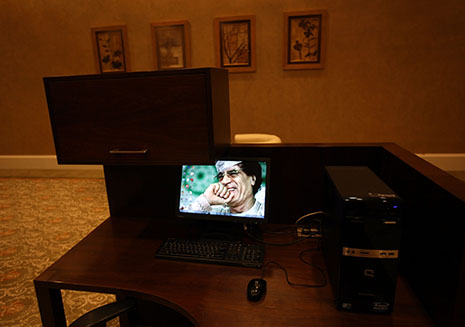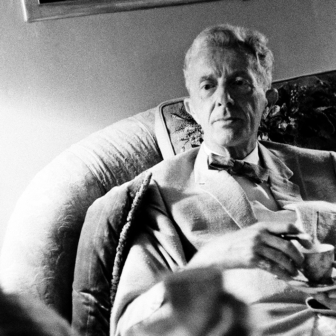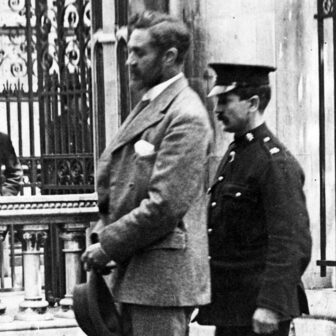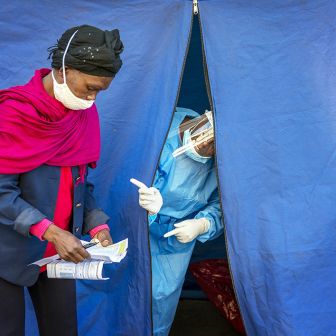The Feast of the Goat, Mario Vargas Llosa’s superb novel set in the Dominican Republic, examines the brutal regime of Rafael Trujillo, the real-life dictator who ruled the island nation from 1930 until his assassination in 1961. The main protagonist is Urania Cabral, a lawyer who returns from New York to the Caribbean long after those years to confront her invalid father, who had served as one of the senior members of Trujillo’s regime. Urania tells him that she can understand how
so many millions of people, crushed by propaganda and lack of information, brutalised by indoctrination and isolation, deprived of free will and even curiosity by fear and the habit of servility and obsequiousness, could worship Trujillo. Not merely fear him but love him, as children eventually love authoritarian parents, convincing themselves that the whippings and beatings are for their own good.
What she can’t comprehend, however, is how so many of the best-educated Dominicans – “the intellectuals of the country, the lawyers, doctors, engineers, often graduates of very good universities in the United States or Europe, sensitive, cultivated men of experience, wide reading, ideas, presumably possessing a highly developed sense of the ridiculous” – could maintain such loyalty to the man known as The Chief, The Benefactor or, most memorably, The Goat.
I bought a copy of the novel at a newsstand at Cairo’s international airport at the beginning of June, aware that I was likely to have some time on my hands in the coming weeks. Having obtained a Libyan visa, I was headed to Tunis, and then on to Tripoli. Like all foreign journalists seeking to cover the war, I was obliged to take the thrice-weekly bus laid on by Muammar Gaddafi’s regime from the border to a Rixos hotel in the Libyan capital.
A five-star, $400-a-night establishment, the Rixos had catered for wealthy businessmen and the domestic elite before the uprising. Now, it was mostly filled with journalists, many of them grumpy about the poor service – the Turkish staff had left and their local replacements seemed half-interested, at best – as well as the harsh restrictions placed on their movements. Nobody was supposed to leave the hotel without a government minder in tow, which, even if it could be arranged, made proper reporting impossible.
But there was time to read, and as I progressed through The Feast of the Goat I began to notice curious similarities between the Trujillo and Gaddafi regimes. Both strongmen had established personality cults; both wielded absolute power while holding no official title for much of their reigns; both had playboy sons whose exploits embarrassed their fathers. And, as I clearly observed in Tripoli, both were surrounded by educated loyalists and sycophants of the sort that Urania Cabral alluded to. In Gaddafi’s case, many were staying at the Rixos or passed time there, sipping overpriced cappuccinos and weeping crocodile tears about how the “Brother Leader,” whose troops have been mercilessly shelling civilian areas in various parts of the country for months, was the victim of the piece.
There was Moussa Ibrahim, the young, slick, British-educated government spokesman, talking about Gaddafi – erstwhile sponsor of Carlos the Jackal, the IRA and the Palestinian terrorist Abu Nidal – as an “honourable figure, so full of glory and organically linked to the people of Libya.” And the prime minister, Baghdadi Mahmudi, a medical doctor, unfortunately fond of the sound of his own voice, insisting that “we shall always remain with Muammar Gaddafi as the leader of this country.” The sense of unreality extended beyond those holding formal title. In the hotel lobby, a sharp-suited aide to Gaddafi’s best-known son, Saif al-Islam – who, with his father, is accused by the International Criminal Court of crimes against humanity – tells me in perfect English that NATO’s aerial campaign targeting the Libyan military is unjust because the noise of the bombs has affected his children’s ability to study for exams. And what of Dr Ali Gashut, a nuclear scientist who studied in England and in the United States, insisting, without offering any evidence whatsoever, that NATO was using depleted uranium in its bombs?
THEIR highly developed sense of the ridiculous was clearly malfunctioning. So was my sense of humour. Often, journalists were bussed to sites bombed by NATO, where local officials were quite clearly telling half-truths about the real function of the destroyed building, and the “victims,” such as a seven-month-old baby girl who had in fact been injured in a road accident, were not real victims at all. And we could always be sure that there would be a small crowd chanting “God, Muammar, Libya, and that’s all” for the TV cameras. In the Goat’s time, it was “God and Trujillo.”
To speak to ordinary people on the streets of Tripoli, we had to sneak out of the hotel. I did this half a dozen times during my eighteen days in the city. Just as Trujillo had done in the Dominican Republic, Gaddafi’s rule had robbed people of their free will. Before the uprising, speaking badly of Gaddafi in public was taboo – a “red line,” as Prime Minister Mahmudi put it, referring to calls for the Libyan leader to go. But now, albeit mostly in whispers, people were willing to risk speaking out.
I did meet some people who supported the regime, but the overwhelming sentiment was anti-Gaddafi. It crossed generations. A man in his fifties, sitting behind a counter in his shop, told me that Gaddafi was “finished.” Another, in his seventies, said that everybody was just waiting for the “time after Gaddafi.” In a coffee shop, a young man studying to be an air traffic controller spoke with barely concealed rage. “We don’t need him,” he said. “Everybody knows that. But here in Tripoli we don’t have weapons. We have to be as one, but there are so many snitches and spies.”
Indeed there were. The next morning, while walking around the Medina with a fellow journalist, I noticed we were being tailed. Suddenly a pickup screeched to a halt next to us and five men with cocked AK-47s bundled us into the car and sped us off to a police checkpoint.
Eventually, realising that we had accreditation, they let us go. But the following afternoon, after my story about the incident appeared online, I was expelled and driven to the Tunisian border by a thuggish-looking young man who had a picture of Gaddafi on his mobile phone. I was lucky. In the Goat’s time, I might have been thrown to the sharks. •




